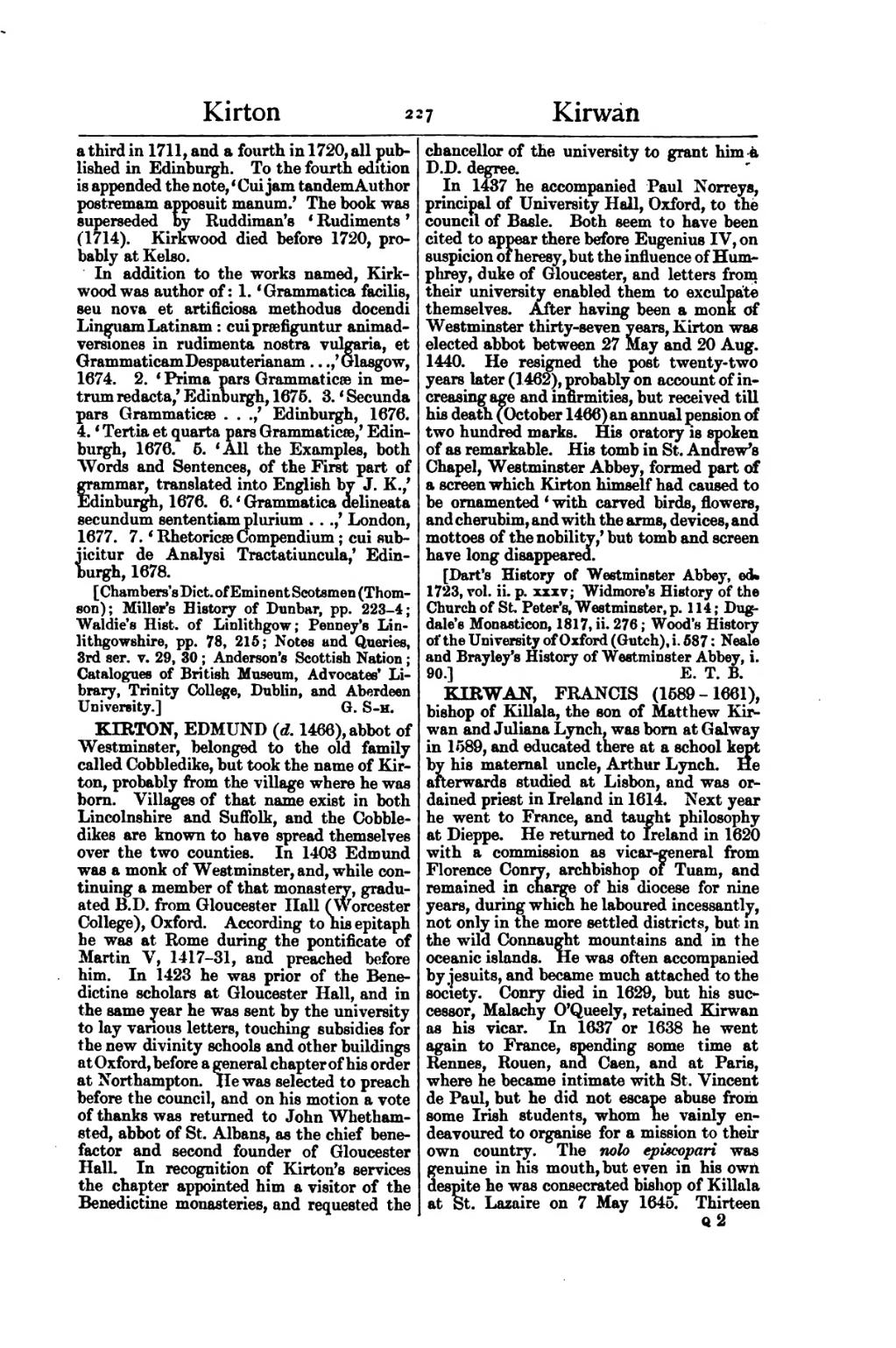a third in 1711, and a fourth in 1720, all published in Edinburgh. To the fourth edition is appended the note, ‘Cui jam tandem Author postremam apposuit manum.’ The book was superseded by Ruddiman's ‘Rudiments’ (1714). Kirkwood died before 1720, probably at Kelso.
In addition to the works named, Kirkwood was author of: 1. ‘Grammatica facilis, seu nova et artificiosa methodus docendi Linguam Latinam: cui præfiguntur animadversiones in rudimenta nostra vulgaria, et Grammaticam Despauterianam …,’ Glasgow, 1674. 2. ‘Prima pars Grammaticæ in metrum redacta,’ Edinburgh, 1675. 3. ‘Secunda pars Grammaticæ …,’ Edinburgh, 1676. 4. ‘Tertia et quarta pars Grammaticæ,’ Edinburgh, 1676. 5. ‘All the Examples, both Words and Sentences, of the First part of grammar, translated into English by J. K.,’ Edinburgh, 1676. 6. ‘Grammatica delineata secundum sententiam plurium …,’ London, 1677. 7. ‘Rhetoricæ Compendium; cui subjicitur de Analysi Tractatiuncula,’ Edinburgh, 1678.
[Chambers's Dict. of Eminent Scotsmen (Thomson); Miller's History of Dunbar, pp. 223–4; Waldie's Hist. of Linlithgow; Penney's Linlithgowshire, pp. 78, 215; Notes and Queries, 3rd ser. v. 29, 30; Anderson's Scottish Nation; Catalogues of British Museum, Advocates' Library, Trinity College, Dublin, and Aberdeen University.]
KIRTON, EDMUND (d. 1466), abbot of Westminster, belonged to the old family called Cobbledike, but took the name of Kirton, probably from the village where he was born. Villages of that name exist in both Lincolnshire and Suffolk, and the Cobbledikes are known to have spread themselves over the two counties. In 1403 Edmund was a monk of Westminster, and, while continuing a member of that monastery, graduated B.D. from Gloucester Hall (Worcester College), Oxford. According to his epitaph he was at Rome during the pontificate of Martin V, 1417–31, and preached before him. In 1423 he was prior of the Benedictine scholars at Gloucester Hall, and in the same year he was sent by the university to lay various letters, touching subsidies for the new divinity schools and other buildings at Oxford, before a general chapter of his order at Northampton. He was selected to preach before the council, and on his motion a vote of thanks was returned to John Whethamsted, abbot of St. Albans, as the chief benefactor and second founder of Gloucester Hall. In recognition of Kirton's services the chapter appointed him a visitor of the Benedictine monasteries, and requested the chancellor of the university to grant him a D.D. degree.
In 1437 he accompanied Paul Norreys, principal of University Hall, Oxford, to the council of Basle. Both seem to have been cited to appear there before Eugenius IV, on suspicion of heresy, but the influence of Humphrey, duke of Gloucester, and letters from their university enabled them to exculpate themselves. After having been a monk of Westminster thirty-seven years, Kirton was elected abbot between 27 May and 20 Aug. 1440. He resigned the post twenty-two years later (1462), probably on account of increasing age and infirmities, but received till his death (October 1466) an annual pension of two hundred marks. His oratory is spoken of as remarkable. His tomb in St. Andrew's Chapel, Westminster Abbey, formed part of a screen which Kirton himself had caused to be ornamented ‘with carved birds, flowers, and cherubim, and with the arms, devices, and mottoes of the nobility,’ but tomb and screen have long disappeared.
[Dart's History of Westminster Abbey, ed. 1723, vol. ii. p. xxxv; Widmore's History of the Church of St. Peter's, Westminster, p. 114; Dugdale's Monasticon, 1817, ii. 276; Wood's History of the University of Oxford (Gutch), i. 587; Neale and Brayley's History of Westminster Abbey, i. 90.]
KIRWAN, FRANCIS (1589–1661), bishop of Killala, the son of Matthew Kirwan and Juliana Lynch, was born at Galway in 1589, and educated there at a school kept by his maternal uncle, Arthur Lynch. He afterwards studied at Lisbon, and was ordained priest in Ireland in 1614. Next year he went to France, and taught philosophy at Dieppe. He returned to Ireland in 1620 with a commission as vicar-general from Florence Conry, archbishop of Tuam, and remained in charge of his diocese for nine years, during which he laboured incessantly, not only in the more settled districts, but in the wild Connaught mountains and in the oceanic islands. He was often accompanied by jesuits, and became much attached to the society. Conry died in 1629, but his successor, Malachy O'Queely, retained Kirwan as his vicar. In 1637 or 1638 he went again to France, spending some time at Rennes, Rouen, and Caen, and at Paris, where he became intimate with St. Vincent de Paul, but he did not escape abuse from some Irish students, whom he vainly endeavoured to organise for a mission to their own country. The nolo episcopari was genuine in his mouth, but even in his own despite he was consecrated bishop of Killala at St. Lazaire on 7 May 1645. Thirteen
